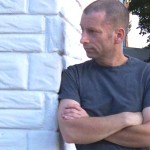Joachim Frank is a German-born scientist and writer who moved in 1975 to Albany, New York and more recently (2008) relocated to New York City. He took writing classes with William Kennedy, Steven Millhauser, Eugene Garber, and Jayne Ann Philipps. His short stories, prose poems and poems have appeared in Lost and Found Times, The Agent, Inkblot, Heidelberg Review, Groundswell, Peer Glass, elimae, 3711 Atlantic, Cezanne’s Carrot, Brilliant, Eclectica, Offcourse, The Noneuclidean Cafe, Ghoti Magazine, Duck and Herring Co. Pocket Field Guide, Raving Dove, Hamilton Stone Review, Bartleby Snopes, Red Ochre Lit, StepAway Magazine, Black&White, and Litbomb. He also wrote three novels, including The Observatory featured here, all still unpublished.
Joachim, the “Downpour” of radioactive rain at the May Day celebration along the Rhine sets a sobering tone for what’s to come. What led you to set the prologue in the wake of Chernobyl and do elements of the Chernobyl disaster continue to resonate throughout The Observatory.
The prologue’s purpose in this novel is to set the stage in Germany, particularly Bonn, where all the action of the main story will take place. The May 1, 1986 event on the banks of the Rhine in Bonn very closely follows historical accounts. I chose it in order to have a plausible reason for the downhill spiral in the marital relationship between Arthur and Eva later on, which leads to their separation. In a way, a relationship is poisoned slowly, in the same way as radioactivity leads to deteriorating health and cancer in the long term. Chernobyl itself as a topic does not recur in the main story; however, its prominence in the prologue serves as an introduction to American readers telling them that the stage is set in post-war Europe with its complicated interconnectedness of East and West. Also, a reminder that Europe is in fact a small theater for events — a cloud coming from the Ukraine reaches Bonn in a few days, the same time as a cloud from coast to coast in the United States.



